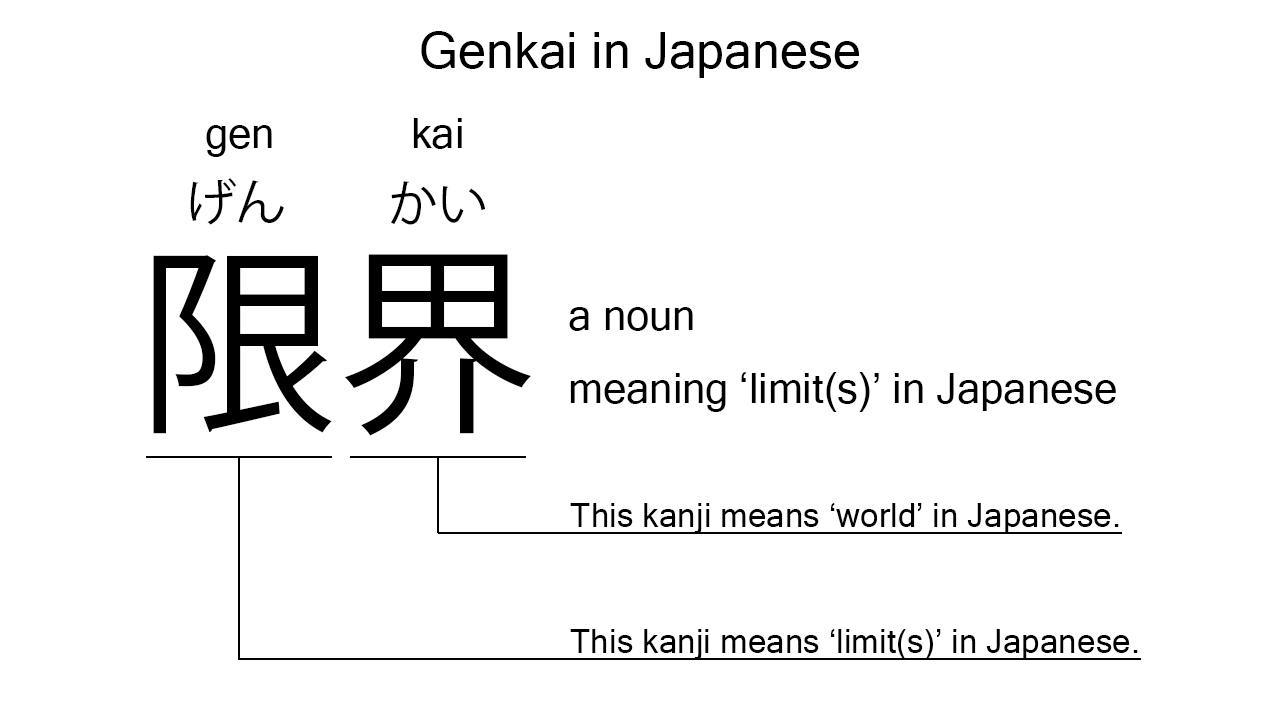What does “genkai” mean in Japanese?
There are some homophones, but native speakers say “genkai” normally to mean ‘limit’ in Japanese. Perhaps, some Japanese learners know this word as it is sometimes used in Japanese conversations. In this blog post, however, I will explain this word in detail based on its kanji expression. And also, I will explain how to use it through example sentences. My explanations would help Japanese learners understand “genkai” more clearly. Then, let’s get started!
Contents
Definition and meaning of “genkai”
Let me start with the definition and meaning of “genkai”.
- genkai – 限界 (げんかい) : a noun meaning ‘limit’ in Japanese. This can also work as plural. Learn more about Japanese plural.
Japanese native speakers use this noun normally to refer to a point which is close to or on the border between two groups – often possible things and impossible things. So, its usage is similar to that of the English noun, “limit”, I think.
The definition and meaning are simple and clear. To understand this noun more clearly, however, let me explain the kanji characters in detail, one by one.
Genkai in kanji
The kanji expression of “genkai” consists of the following two kanji characters:
- 限 : a kanji character used to mean ‘limit’, ‘bounds’, ‘end’, or such in Japanese. This can also be found in other words like “mugen“.
- 界 : a kanji character used to mean ‘world’, ‘society’, ‘community’, or ‘area’ in general in Japanese. This can also be found in other words like “sekai“.
These two kanji characters tell us that “genkai” literally means ‘limit of the world’ in Japanese. This literal interpretation is not completely in line with the meaning, but still understandable, I think. A point on the border between two groups can often be considered as the limit of one world.

When we meet new kanji expressions, we should check their kanji characters in detail to understand their meanings clearly and deeply. In many cases, kanji characters tell us a lot about the meanings of the expressions they form. Actually, here, we could get the better understanding of “genkai” through the detailed check above.
So far, I’ve explained the definition and meaning of “genkai” together with its kanji characters. Then, let me explain how to use it through the example sentences below.
Example #1: how to say “this is my limit” in Japanese
kore ga watashi no genkai desu – これが私の限界です (これがわたしのげんかいです)
This is my limit.
Below are the new words used in the example sentence.
- kore – これ : a demonstrative pronoun referring to a thing close to the speaker. In the example, this means ‘this’ in Japanese.
- ga – が : a case particle used to make the subject word or the object word in a sentence. In the example, this is used after “kore” to make the subject in the sentence.
- watashi – 私 (わたし) : a pronoun meaning ‘I’ in Japanese.
- no – の : a case particle used after a noun or pronoun to make its possessive case. In the example, this is used after “watashi” to make its possessive case, “watashi no“, which means ‘my’ in Japanese.
- desu – です : an auxiliary verb used after a noun or adjective to make it polite. Probably, this is well known as a part of Japanese desu form. In the example, this is used after “watashi no genkai” to make it sound polite.
This is a typical usage of “genkai”. In this example, it works as a part of the noun phrase, “watashi no genkai”, which means ‘my limit’ in Japanese. When we want to mean ‘limit’ in Japanese, anyway, this noun is a very good option.
Example #2: another usage of “genkai”
genkai wa nai – 限界は無い (げんかいはない)
There is no limit.
Below are the new words used in the example sentence.
- wa – は : a binding particle working as a case marker or topic marker. In the example, this works after “genkai” to make the subject in the sentence.
- nai – 無い (ない) : an i-adjective used to say that something does not exist. In the example, this is used to deny the existence of the limit.
This is another typical usage of “genkai”. Sometimes, Japanese native speakers use this example sentence to mean ‘there is no limit’ or perhaps ‘the sky is the limit’. It’s worth knowing.
Summary
In this blog post, I’ve explained the definition and meaning of “genkai” in detail based on its kanji expression. And also, I’ve explained how to use it through the example sentences. Let me summarize them as follows.
- genkai – 限界 (げんかい) : a noun meaning ‘limit’ in Japanese. This can also work as plural. These two kanji characters literally mean ‘limit of the world’ in Japanese. This literal interpretation is not completely in line with the meaning, but still understandable, I think. Japanese native speakers use this noun normally to refer to a point which is close to or on the border between two groups – often possible things and impossible things. A point on the border between two groups can often be considered as the limit of one world.
Hope my explanations are understandable and helpful for Japanese learners.
Leave a Reply